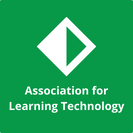ALT
ALT White Rose - Navigating Digital Accessibility: Sector Insights and Student Voices
-
Gain insights from three keynote speakers as they explore digital accessibility from an organisational perspective
- Listen to a student panel sharing their lived experiences of digital accessibility in learning
- Engage with academics and professionals from across the sector as they discuss strategies for enhancing digital accessibility
13.00-13.05 Introductions
13.05 - 13.25 Keynote 1: Léon Consearo, Leeds Trinity University
13.25 - 13.45 Keynote 2: Lilian Joy and Richard Walker, University of York
13.45 - 13.50 Questions
13.50 - 14.30 Student Panel
14.30-14.45 Break
14.45 - 14.55 Lucy Thacker & Lucy Bird, The University of Leeds - Lightening the Load: The Course Accessibility Service
14.55 - 15.05 Alice Bennett, University of York - AI and accessibility: help or harm?
15.05 - 15.15 Dania Ghani, Sheffield Hallam University - Leveraging Early-adoption User Insights to Shape Digital Accessibility in Blackboard Ultra
15.15 - 15.25 Alice Clayton & Jo Law, University of Leeds - Inclusive design and illustration
15.25 - 15.35 Tom Tomlinson, University of Hull - From Afterthought to Action: Tackling Accessibility Barriers
15.35 - 16.00 Questions and Conclusion
AmplifyFE Community Space Workshop: AI and creativity
Join Dr. Abbie Cairns, an artist-teacher with a passion for blending creativity and technology, for a session on AI and Creativity. In this webinar, Abbie will explore the evolving role of AI in art education, focusing on how AI tools can be integrated into creative practice to inspire and challenge learners. Discover how AI is transforming the landscape of art and design, offering new possibilities for digital art creation, design exploration, and innovative teaching methodologies. Abbie will share insights from her own teaching practice, where AI enhances student creativity and encourages experimentation with new media. This session will offer valuable ideas on how AI can unlock creativity
Shaping the Future of Digital Badging
The Digital Badging Commission, established in 2024 by the Royal Society of Arts, Manufactures and Commerce (RSA) and Ufi VocTech Trust, aims to revolutionise the recognition of skills and learning in the UK.
Considering digital badges are a promising tool for recognising and verifying skills, particularly those acquired outside traditional educational pathways, understanding the breadth of their adoption across a wide variety of settings, as well as their impact and potential, remains limited in the UK context.
The Digital Badging Commission brings together senior leaders and experts from education, industry, technology and policy to address this gap and develop recommendations for a more effective digital badging ecosystem that supports progress and recognition of skills within lifelong learning.
The session will present the key findings and progress of the commission so far, primarily focusing on challenges and opportunities identified through the available literature, through case study interviews with stakeholders, and from interactive stakeholder workshop sessions run by the commission.
Presenter: Rebecca Purton
This event is held in partnership with Ufi VocTech Trust. The strategic partnership between ALT and Ufi has been supporting professionals in Further and Vocational Education to connect, share, collaborate and learn through the AmplifyFE Community Space since 2020.
Submit Your Proposal for OER25
Unsubscribe [1]
View in your browser [2]
[3]
SUBMIT YOUR PROPOSAL FOR OER25
We’re pleased to share that the Call for Proposals for the Open Education
Conference 2025 is now open. Don't miss this exciting opportunity to
showcase innovative practices, groundbreaking projects, and impactful
research exploring Open Education in a changing world.
[3]
OER25 - SPEAKING TRUTH TO POWER: OPEN EDUCATION AND AI IN THE AGE OF
POPULISM [4]
DATE: 23-24 June
LOCATION: Resource for London [...]
OER25 Call for Proposals Now Open
We’re pleased to share that the Call for Proposals is now open for OER25 - Speaking Truth to Power: Open Education and AI in the Age of Populism
